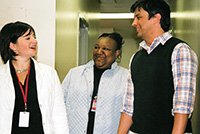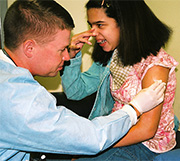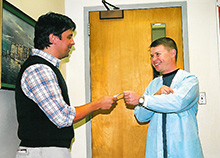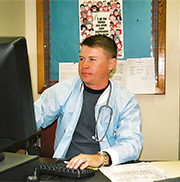What additional information would be important for Mr. Logan to know as a school nurse?
Page 4: Resources
The more knowledge Mr. Logan has about different types of disabilities, the better healthcare services he can provide to the students at his school. Two of the primary sources of information that are available to him are professionals and written materials. In order to access these sources, Mr. Logan needs to learn how to establish a professional network and to identify valid resources.
Establishing a Network
 Establishing a network with school personnel, community-based agencies, national or state associations, and disability specialists is one way for school nurses to exchange information and to form relationships with knowledgeable professionals. Collaborating with individuals within the network allows school nurses to gather different perspectives on an issue and to receive support and validation for a plan of action.
Establishing a network with school personnel, community-based agencies, national or state associations, and disability specialists is one way for school nurses to exchange information and to form relationships with knowledgeable professionals. Collaborating with individuals within the network allows school nurses to gather different perspectives on an issue and to receive support and validation for a plan of action.
Mr. Logan is providing healthcare services to Megan, who has cerebral palsy and type 1 diabetes. He has limited knowledge about cerebral palsy, so after gaining permission from Megan’s mom, he contacts:
 A representative at a community-based agency (e.g., United Cerebral Palsy Organization)
A representative at a community-based agency (e.g., United Cerebral Palsy Organization)- A parent or guardian of a child with the same type of cerebral palsy
- Megan’s pediatrician
After speaking with all of these people, Mr. Logan has a more comprehensive understanding of Megan’s disability and her healthcare needs.
By building a network of people who have a working knowledge of disability issues and expertise on healthcare practices, school nurses enhance their ability to meet the healthcare needs of the students at their schools.
![]()
Networking 101
Here are some ideas school nurses can use to build and establish a network of school personnel, community professionals, and disability specialists:
 Prepare and distribute business cards with contact information.
Prepare and distribute business cards with contact information.- Be active in local nursing organizations and in your local department of public health.
- Take an active role in healthcare research projects within the school and community.
- Establish a relationship with the public health clinic.
Identifying Sources

Given the amount of readily accessible information, it is important to be able to identify accurate and reliable sources of information. When consulting research-related sources, it is paramount to ensure that the sources provide evidence-based or best-evidence information.
best-evidence information
Recommendations that, because no large-scale studies exist to confirm their validity, are instead based on the best available evidence.
Some examples of reliable sources include but are not limited to:
- Government sponsored websites (e.g., National Institute for Nursing Research, Center for Disease Control and Prevention)
- Scientific or professional journals (e.g., Journal of School Nursing, Exceptional Children)
- Professional organizations (e.g., National Association of School Nurses, Council for Exceptional Children)
Gathering evidence-based or best-evidence information goes hand-in-hand with networking. As school nurses establish their networks, they should look for indications that individuals and agencies are consistently applying evidence-based information.